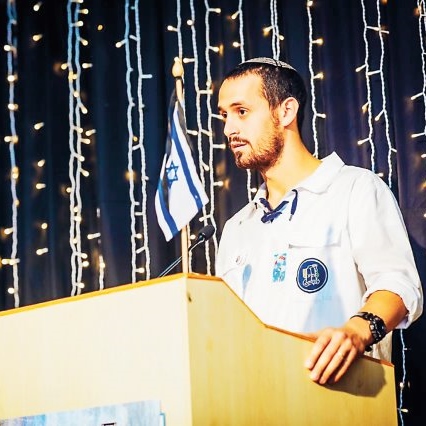
News

Real-life heroes bring Yom Hazikaron home for Cape community
TALI FEINBERG
They saw a room with a football shirt on the bed, an Israel Defense Forces uniform on a rail, and posters on the walls – a bedroom waiting for a soldier even though he was never coming home.
Bnei Akiva Shaliach Lavi Wolff brought home this reality by sharing how he lost a friend just last year. “I met Aviv in my first period of combat training in the army. I immediately spotted a guy with a big smile and a great heart – that kind of guy that always greets you with a ‘Good morning!’.
“After eight months, we were commanders in the same company. Aviv was definitely a hero. A man with a personal goal to protect his nation. But behind that hero, Aviv was a down-to-earth guy. He liked surfing, partying, and spending time with family at the beach. I remember him giving up his free weekend so that his fellow commander could go home for a family occasion.”
But this youthful, vibrant young man was lost in combat. He was wounded badly in the chest, hit by a sniper while on guard duty on the Gaza border. “Aviv fell on 20 July 2018 at the age of 21. His parents were on a family vacation in Italy when they got the call. He was buried on the Fast of Tish’a B’Av.”
The moving ceremony at Herzlia included captivating performances from the youth, including the Herzlia vocal ensemble and the Bein Ha’shmashot choir from Israel, some of whom sang with tears in their eyes.
Candles were lit by the youth movements, and Albert Shorkend, a veteran of the 1948 War of Independence. A harrowing film showed the loss, bewilderment, and love of a family that lost two sons in battle.
“Yom Hazikaron for Israel’s fallen soldiers and victims of terror is a day to mourn the dead and appreciate their sacrifice in order for us to have a strong, flourishing state, “said Community and Aliyah Shlicha Michal Ilan.
“Yom Hazikaron is personal and collective. We mourn our dead, the ones we knew. And we do so as a collective. This is our day to stop, to pause. Everything stops: the streets are empty, the shopping malls are closed, there is nothing on television or radio that is not related to the topic. The only places that are full are the cemeteries and homes of bereaved families,” she said.
“On Yom Hazikaron we mourn what could have been. The potential pianist, writer, lawyer, mother, father, and friend. On other days, we might be divided, split into tribes. But on Yom Hazikaron, we are one united family. Religious, secular, Druze, Bedouin, men, women… death doesn’t differentiate. As a nation, we are responsible for making sure their sacrifice was not in vain. We are responsible for working together to make Israel better. We must strive to learn to live better together – not just when we meet in military cemeteries.”




